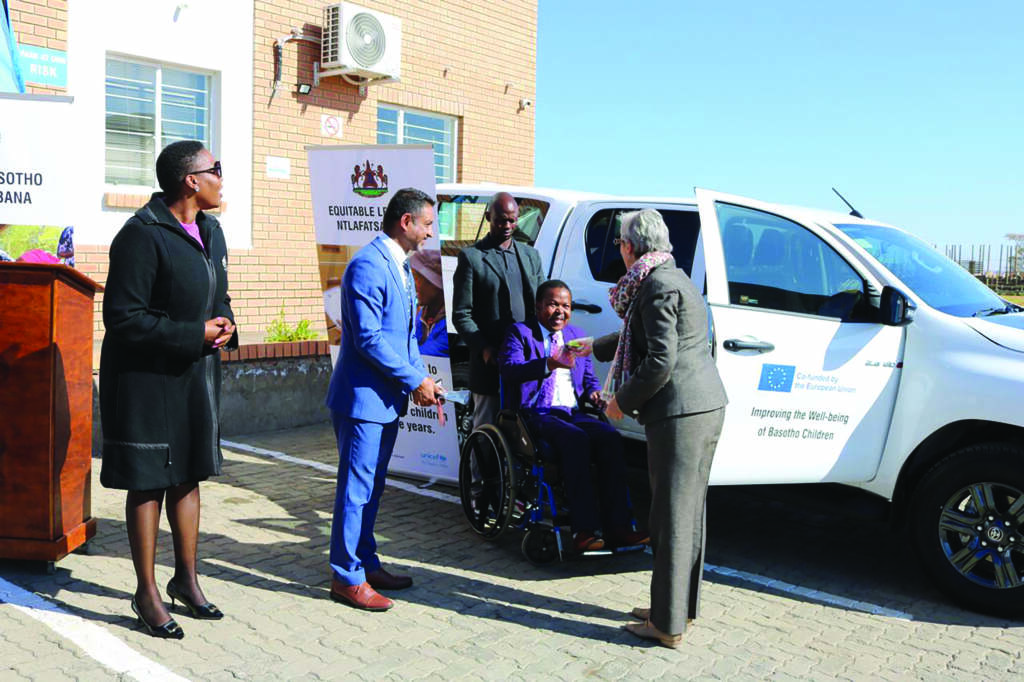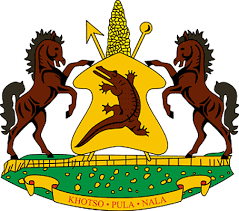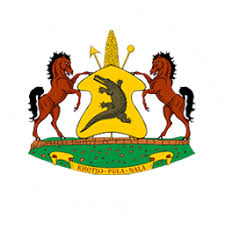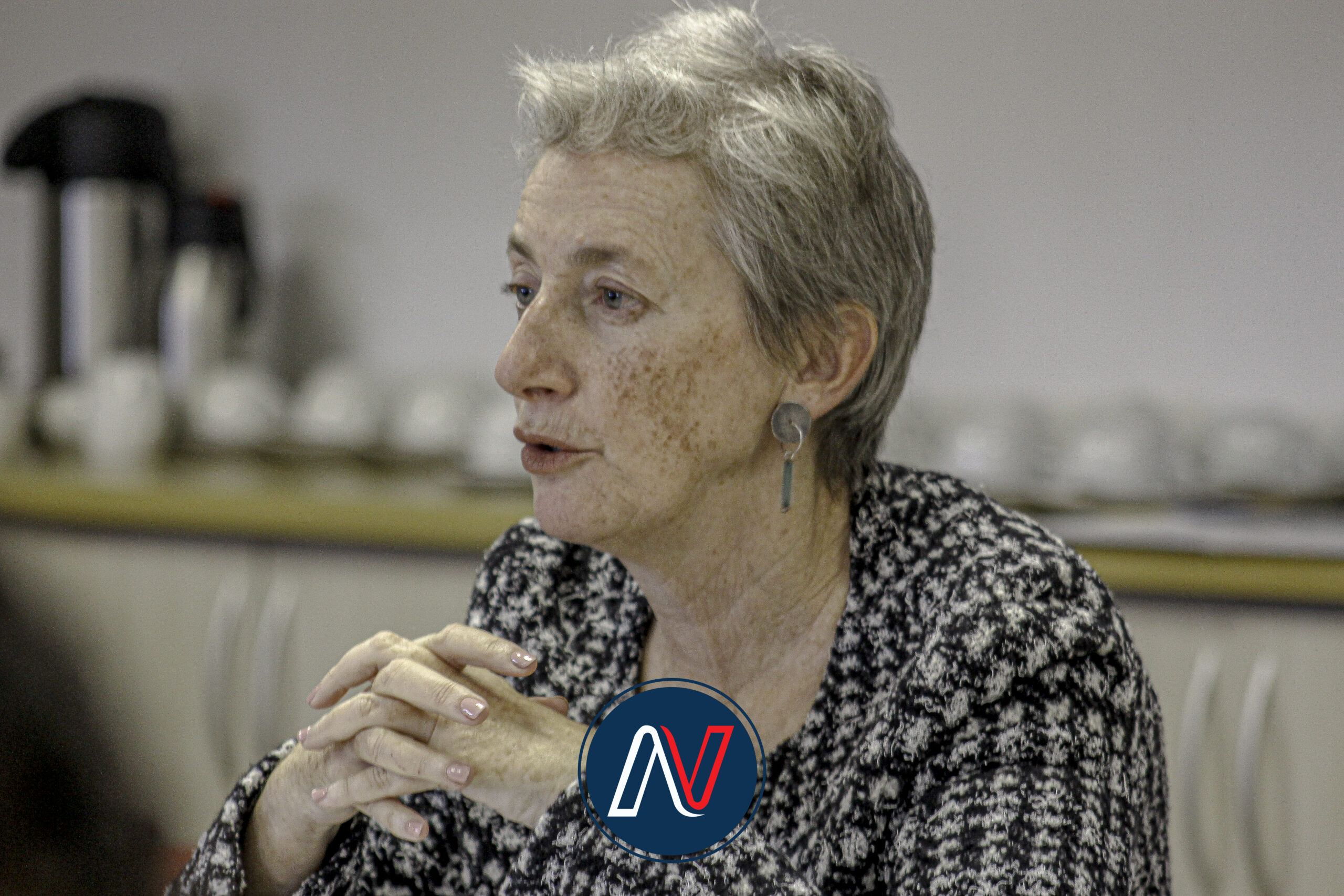Lehlohonolo Motsoari
In a move to enhance the capacity of the government to deliver social assistance programmes, the Ministry of Gender, Youth, and Social Development (MoGYSD) received a substantial boost yesterday.
Two new vehicles, 10 laptops, and 20 tablets were handed over to support the Ntlafatsa Bana-Improvement for Children programme, a key component of the Equitable Lesotho initiative.
The handover ceremony, held at Kick for Life grounds, was graced by the Minister of Gender, Youth and Social Development, Pitso Lesaoana, the Ambassador of the European Union (EU), Paola Amadei, and the UNICEF Lesotho Country Representative, Deepak Bhaskaran.
“This provision of vehicles, laptops, and tablets marks a pivotal moment for us. It will significantly enhance the implementation of our social assistance programmes,” Lesaoana remarked.
He added that the new resources would address the transport and mobility constraints currently faced by MoGYSD, facilitating the effective management of the National Information System for Social Assistance (NISSA) and the transition to digital payments.
Lesaoana highlighted the ongoing efforts since 2009 to combat the triple threats of poverty, food insecurity, and HIV/AIDS, which have severely impacted orphaned and vulnerable children.
“In the fourth phase, or under Ntlafatsa Bana, we will introduce and scale up innovations, linking Child Grants Programme (CGP) households to child-specific interventions that can improve well-being in the first five years of life, including birth registration, nutrition, and access to sustainable energy solutions. We will also increase the coverage of digital payments and update NISSA data,” he stated.
Ambassador Amadei emphasised the transformative impact of digital payments, noting: “Receiving a payment on the phone or at the bank allows a single mother to spend her precious time on her occupations rather than walking long distances to collect her cash subsidy, and then walking back in fear of being assaulted.
“It also means great savings for all Basotho, as the government would not need to contract services for physical subsidy distribution. A click will do. We are all eager to see the long lines at distribution points become a thing of the past.”
UNICEF Lesotho Country Representative Bhaskaran underscored the importance of digital transformation. “During this phase of our partnership, we are supporting the upgrading of NISSA to ensure it functions efficiently while transitioning social grant beneficiaries from manual to digital payment systems, including mobile payments and banking services. Currently, over 13,000 beneficiaries are receiving their payments via mobile platforms. Digitalisation offers enhanced cost-effectiveness and timely cash delivery to beneficiaries,” he said.
Spanning from 2023 to 2026, the Ntlafatsa Bana-Improvement for Children programme aims to improve the delivery of the CGP, reducing delivery costs by shifting towards digital payments and better targeting support through accurate data collection and processing.
Building on the previous three phases of the programme, operating since 2007, this phase seeks to support beneficiaries in accessing sustainable energy, water, and nutrition services, as well as birth registration.
The programme, a joint initiative of the EU, UNICEF, and the government of Lesotho, involves key government ministries including Agriculture, Home Affairs, Gender, Youth and Social Development, and Natural Resources.
It will be implemented in the districts of Qacha’s Nek, Quthing, Thaba-Tseka, Leribe, and Mohale’s Hoek.
Since 2007, the partnership between the government, EU, and UNICEF has built a robust social protection system in Lesotho, resulting in the CGP, NISSA, and strengthened institutional capacity within the Ministry of Social Development.
The CGP has significantly reduced child deprivation by enhancing access to essential services such as nutrition, water, and child protection, in addition to providing cash transfers to households.
To date, about 87,000 children have benefited from these services.
Summary
- In a move to enhance the capacity of the government to deliver social assistance programmes, the Ministry of Gender, Youth, and Social Development (MoGYSD) received a substantial boost yesterday.
- “Receiving a payment on the phone or at the bank allows a single mother to spend her precious time on her occupations rather than walking long distances to collect her cash subsidy, and then walking back in fear of being assaulted.
- Since 2007, the partnership between the government, EU, and UNICEF has built a robust social protection system in Lesotho, resulting in the CGP, NISSA, and strengthened institutional capacity within the Ministry of Social Development.

Your Trusted Source for News and Insights in Lesotho!
At Newsday Media, we are passionate about delivering accurate, timely, and engaging news and multimedia content to our diverse audience. Founded with the vision of revolutionizing the media landscape in Lesotho, we have grown into a leading hybrid media company that blends traditional journalism with innovative digital platforms.









